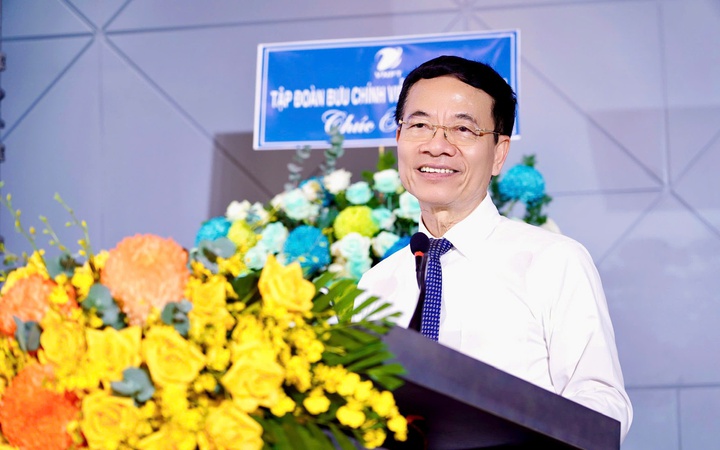
The message was shared by Minister of Science and Technology Nguyen Manh Hung at an intimate meeting with representatives of retired officials in the science, technology and post and telecommunications sectors, which took place on the afternoon of August 23 in Ho Chi Minh City. The event was not only a profound gratitude to the generations who contributed to laying the foundation for the sector, but also an opportunity for the Minister to express the new vision and mission of the Ministry of Science and Technology after the merger.
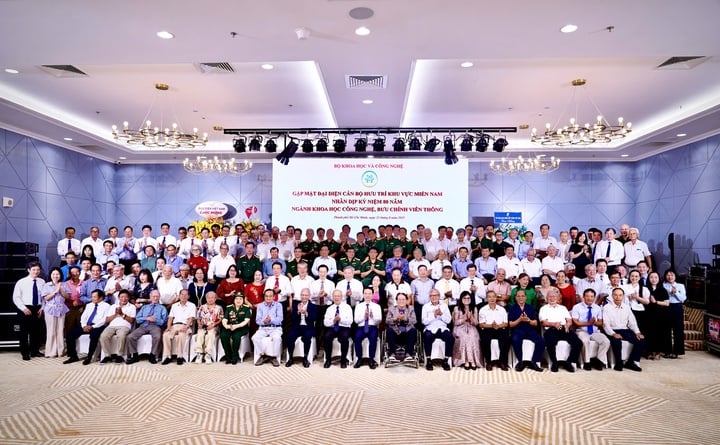
Minister of Science and Technology Nguyen Manh Hung and representatives of retired officials in the science, technology and post and telecommunications sector in the Southern region.
In the solemn and emotional atmosphere of the meeting, Minister Nguyen Manh Hung expressed his joy at meeting many veteran officials who held important positions in the postal and telecommunications, science and technology, press and publishing sectors, and have made great contributions to the country's development.
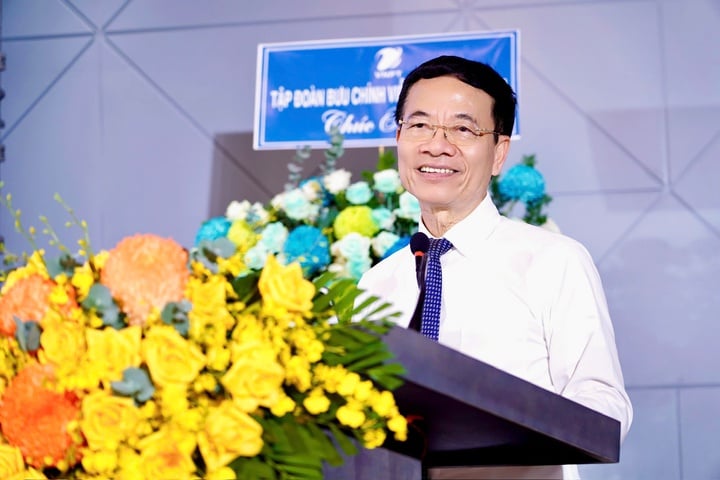
Minister Nguyen Manh Hung affirmed: The historic moment has come for science, technology and innovation.
Many familiar faces who have been associated with the historical stages of the industry were present, such as Mr. Do Trung Ta, former Minister of Posts and Telecommunications; Mr. Mai Liem Truc, former Director General of the General Department of Posts; Mr. Nguyen Ba, former General Director of VNPT; Ms. Ha To Nga, former Director of Viettel Southern Region; Mr. Le Van Khoi, former Director of Ho Chi Minh City Nuclear Center; Mr. Nguyen Ngoc Tran, former Deputy Chairman of the State Committee for Science and Technology; Mr. Tran Viet Thanh, former Deputy Minister of Science and Technology; and many other comrades who were leaders and leading experts in the industry.
The Minister shared his deep emotion when meeting again with respected teachers and colleagues, living witnesses of the industry's development milestones through many periods, including those who are now in their 80s and 90s but still maintain their passion for their profession and their country.
Science, technology and telecommunications have created important turning points for the country.
At the beginning of the meeting, the Minister reviewed the history and some of the major achievements the industry has made in its 80-year journey.
On August 15, 1945, Uncle Ho signed the decision to establish the Specialized Communications Board and since then it has become the traditional day of the postal industry. The role of the industry was taught by Uncle Ho "Information and communication are the nerves, the blood vessels of the human being" when visiting the Radio Wave Group, the Communications Army in 1966. The history of the industry sometimes stood alone or together with other industries such as the Post and Radio Department under the Ministry of Communications and Public Works, the General Department of Posts under the Government; the General Department of Posts under the Ministry of Communications and Posts...
In 2002, the Ministry of Posts and Telecommunications was established and from 2007 merged with the press and publishing sector to form the Ministry of Information and Communications. By March 1, 2025, the press and publishing sector will separate, and the post and telecommunications sector will merge with the Ministry of Science and Technology.
Meanwhile, in 1959, the State Science Committee was established, in 1993 it was changed to the Ministry of Science, Technology and Environment and officially named the Ministry of Science and Technology in 2002 when the environmental sector was separated.
Since 2014, May 18 has been chosen as Vietnam Science and Technology Day, associated with Uncle Ho's speech at the first Congress of the Association for Popularization of Science and Technology in 1963: "Science must come from production, then return to serve production", meaning it must stick to reality.
The Minister said that in the 80-year journey, the two sectors have the same origin, sharing both pride and loss when more than 12,000 officers and soldiers sacrificed their lives in the war.
According to the Minister, if we list all the sectors, it will include science, technology, innovation, post and telecommunications, digital industrial technology, digital transformation, intellectual property, standards - measurement - quality, and nuclear energy. These are all important infrastructure sectors in the digital age, the knowledge age.
Reviewing some of the industry's achievements, the Minister commented that in four decades of innovation, science, technology and post and telecommunications have created important turning points for the country.
Firstly, Agricultural Science is one of the most convincingly successful fields, contributing to turning Vietnam from a food-deficient country into a powerhouse in exporting agricultural products such as rice, coffee, and pepper.
In terms of technology, Vietnam has shifted from purely importing technology to gradually mastering many key technology fields, especially in infrastructure construction (roads, hydroelectric plants, drilling rigs, 500KV power lines...), biomedicine (rice varieties, vaccines), mechanics, materials, and defense industry, marking a remarkable growth of the national technology industry, affirming the research, design, and manufacturing capacity of Vietnamese people in the journey of innovation and development.
Regarding innovation, the technology startup ecosystem in Vietnam has been formed rapidly and spread strongly, with thousands of innovative enterprises and many products reaching the global market. National high-tech zones have been formed in Hanoi, Ho Chi Minh City, and Da Nang. Vietnam is among the top in the world in terms of innovation capacity. The global innovation capacity ranking is 42.
And in particular, telecommunications and digital technology are developing rapidly. The Postal Service is at the forefront of Innovation through digitalization and successful modernization of Vietnam's telecommunications network. In 1993 - mobile phones and in 1997 - Internet came to Vietnam, in 2008 - telecommunications satellites were launched, all very early. Vietnam is among the top countries in the world in terms of coverage and popularity of mobile phones and the Internet.
Since 2020, Vietnam has officially launched a national digital transformation program, with the goal of developing comprehensive digital infrastructure, creating a solid foundation for building a digital nation and digital economy.
During this process, the postal industry has undergone a strong transformation, becoming an essential logistics infrastructure, playing an important role in the material flow of the digital economy. Currently, Vietnam's postal industry is ranked 31st in the world in terms of development index.
In terms of telecommunications, Vietnam maintains its position in the global top 20 in terms of mobile network speed, telecommunications infrastructure ranks 67th, while e-government/digital government is ranked 71st according to prestigious international rankings.
Minister Nguyen Manh Hung emphasized: "After 40 years of renovation, we are entering the second renovation. If the first renovation helped the country escape poverty, this time it is to make the country rich, powerful and prosperous."
In the field of science and technology, the first reform, starting in 1986, considered science and technology as the top national policy, focusing on research, application, import and acquisition of technology. In the second reform, starting in 2020, the focus shifted to innovation, building a national innovation system, in which enterprises and markets play a central role, and science and technology becomes a core component in a larger ecosystem.
For the post and telecommunications industry, the first innovation also started in 1986, focusing on network digitalization and service universalization. In the second innovation, from 2020, the industry shifted to comprehensive digital transformation, developing digital infrastructure, logistics infrastructure, and digital technology industry. Digital infrastructure has become a national strategic infrastructure, the foundation of the digital economy and digital society, while digital transformation has become a key driving force for the country's development.
Orientation of the Unifier, Resonance of the Triplet
Regarding the upcoming orientation, Minister Nguyen Manh Hung said that the 2025-2030 period is the first term of the unified Ministry of Science and Technology, and also the first term to implement Resolution 57 of the Politburo on breakthroughs in the development of science and technology, innovation and national digital transformation.
This is also the first term to comprehensively implement the second round of innovation in science and technology and post and telecommunications, bringing the three strategies of science and technology, innovation and digital transformation under one roof. In particular, this is the term in which science and technology, innovation and digital transformation take on the mission of becoming the main driving force to realize Vietnam's aspiration to develop into a high-income country, following a socialist orientation.
The merger of the two ministries aims to create synergy and eliminate the boundaries between science and technology, innovation and digital transformation, digital technology and digital infrastructure. This is also a requirement for a new approach, new working methods, and creation of new values.
Fundamental innovation is science and technology, innovation and digital transformation must aim at the ultimate goal of improving national competitiveness, increasing labor productivity, improving national governance capacity, promoting economic growth, ensuring national defense and security and improving people's quality of life. These areas need to contribute at least 50% of the growth of gross domestic product, as President Ho Chi Minh taught: Science and technology must come from production and return to serve production.
Science, technology, innovation and digital transformation must focus on solving national strategic problems such as promoting double-digit growth, effectively implementing the two-tier government model, improving the quality of institutions, human resources, infrastructure, public services and product quality.
The spirit of innovation is the close connection between science and technology, innovation and digital transformation, forming a technology - innovation - data ecosystem, shifting from process-based management to goal-based and result-based management. It is necessary to implement a spending contract: the State only spends on research, research results belong to the institute; if the institute sells products, it will benefit, and at the same time, 30% must be reserved for the group implementing the topic so that they can get rich legitimately. If the research results create products with revenue 5-10 times larger than the research cost, it is considered a success, no longer bound by administrative procedures. Enterprises are placed at the center of the national innovation ecosystem, institutes and schools are the source of knowledge, the State plays the role of creating and connecting the whole people and the whole society to participate in innovation and digital transformation.
Science and technology focuses on mastering strategic technologies and products. The Government has issued a list of 11 high-tech groups. For the first time, Vietnam has declared its determination to master high technology. Innovation must approach, change and solve practical problems in Vietnam, form the spirit of innovation among all people, make innovation a way of life and lifestyle for everyone and organizations, build a startup nation based on digital technology and innovation, and promote one-person businesses.
Postal infrastructure is transformed into logistics infrastructure, becoming essential national infrastructure, ensuring the flow of material in parallel with the flow of data. Telecommunications infrastructure is transformed into digital infrastructure serving national digital transformation, ensuring universality, ultra-wide bandwidth, large capacity, green, open, smart, safe and sustainable. Developing the digital technology industry into a foundational and spearhead industry, mastering core technology, ensuring digital sovereignty and becoming the driving force for national digital transformation. Digital transformation must be universal and comprehensive to develop digital government, digital economy and digital society.
Standards are the direction of national development, regulations create national protection barriers. The standards sector will have to build a large number of standards to serve national development, currently only meeting about 5% of the demand.
Intellectual property is a lever to increase intangible assets and national competitiveness. The task of the intellectual property sector is to turn intellectual property into commercializable assets. A rich country is a country where 80% of its assets are intangible assets, intellectual property, while a poor country mainly relies on physical assets. Developing intellectual property is the way for Vietnam to become rich.
Nuclear energy is a strategic foundation to ensure energy security and improve the national science and technology level. Vietnam will master nuclear technology and is expected to have 15-20 large-scale nuclear power plants by 2050, accounting for 10-15% of total electricity output.
"Science, technology, innovation and digital transformation will become a breakthrough driving force for national development. The historic moment has come for science, technology and digital transformation," Minister Nguyen Manh Hung emphasized.
The Minister also placed his trust in today's youth with the mission of continuing the journey of previous generations - those who paved the way, built the foundation of knowledge and connected the nation.
According to the Minister, today's generation not only masters technology, but also creates technology; not only receives knowledge, but also explores new knowledge; not only builds digital infrastructure, promotes digital transformation in all fields, but also creates a safe, healthy and trustworthy cyberspace for all people, to contribute to making Vietnam rise strongly in the digital and knowledge era.
The young generation must "always be grateful to previous generations" and have big dreams, a spirit of serving the Fatherland, equipped with a solid knowledge foundation and fluent in three "languages": Vietnamese to preserve national identity, English to integrate internationally and digital language to master the digital environment. AI must become an essential working tool for work, aiming for the final result of serving people and businesses.
The Minister sent his best wishes for health and happiness to all generations of officials in the industry and expressed his belief that, with unanimity, inheritance and constant innovation, the Science and Technology, Post and Telecommunications sectors will continue to reap great success, contributing to building a strong, prosperous and happy Vietnam, as President Ho Chi Minh advised: "Vietnam stands shoulder to shoulder with the great powers of the five continents."
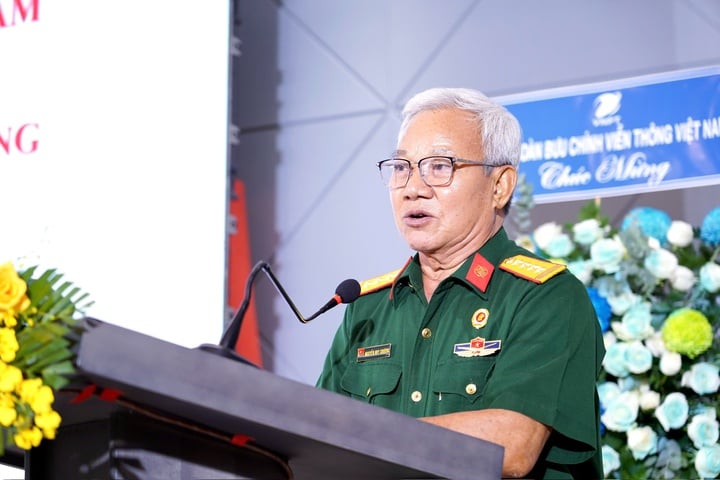
Colonel Nguyen Huy Chuong, Former Chief Representative of the Southern Representative Office, Military Telecommunications Industry Group.
At the meeting, Colonel Nguyen Huy Chuong, former Chief Representative of the Southern Representative Office of the Military Industry and Telecommunications Group, representing 19 retired Viettel cadres in the Southern region, expressed his emotion and pride at attending the event. He said that this was a special occasion to review the glorious tradition of the industry and express gratitude for the deep concern of the leaders of the Ministry of Science and Technology. He emphasized: "This is not only an honor, but also a great happiness to reunite, share and relive precious memories together."
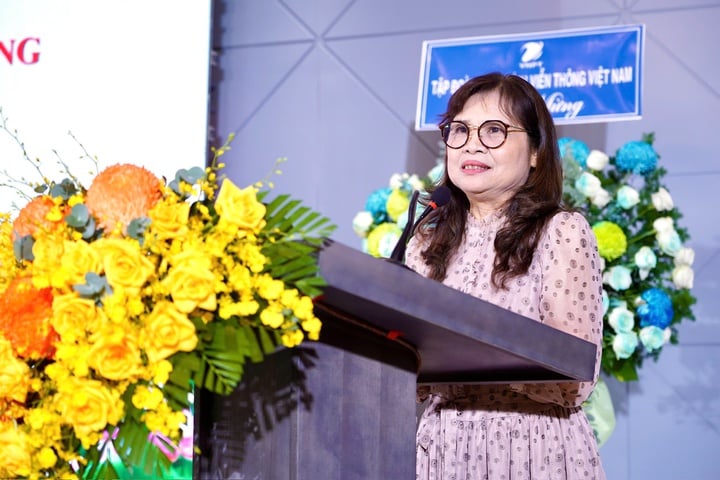
Ms. Tran Thi Thu Thuy, Former Deputy Director of the Southern Affairs Department, Ministry of Science and Technology.
Ms. Tran Thi Thu Thuy, former Deputy Director of the Southern Affairs Department of the Ministry of Science and Technology, emotionally shared about her journey of nearly 40 years working at the Ministry of Science and Technology since 1987. She especially remembered the dedicated guidance from the early days of comrade Mai Liem Truc, former Permanent Deputy Minister of the Ministry of Posts and Telecommunications. She also expressed her belief when she learned that the S&T information units would continue to be maintained after the information about the merger of the units and said that the warm and close atmosphere of the meeting was a testament to the attachment and belief of generations of retired cadres in the sustainable development of the industry in the new era.
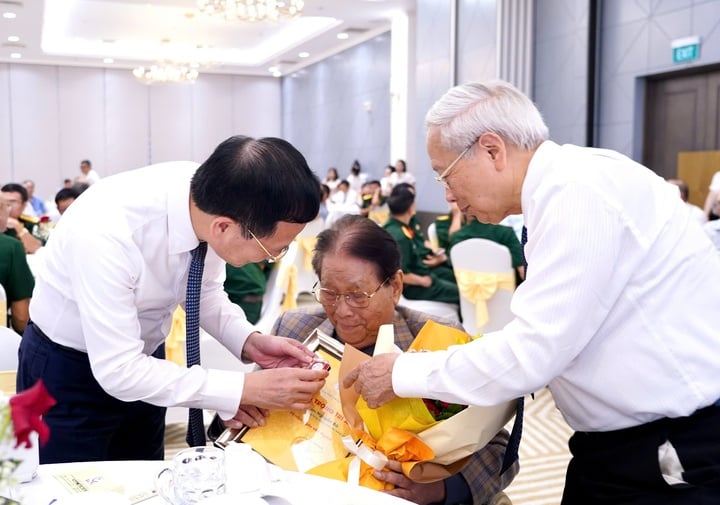
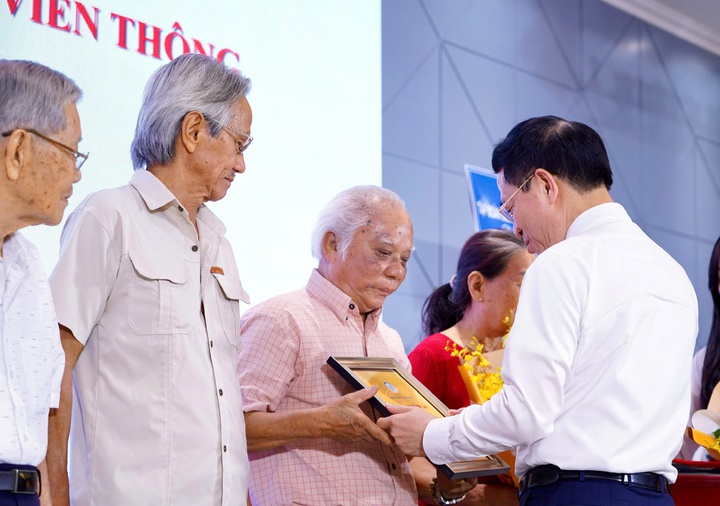
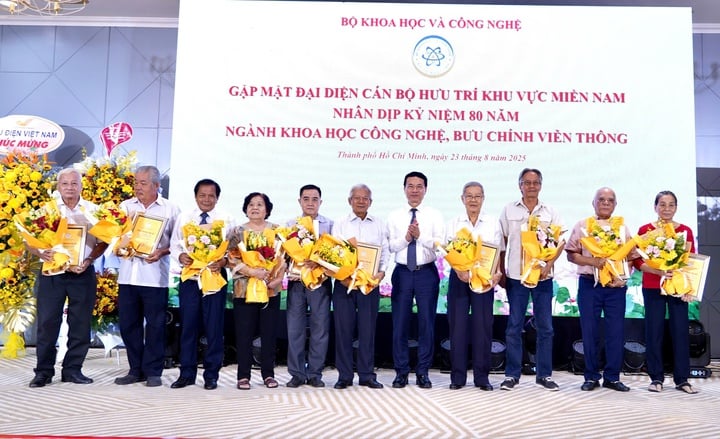
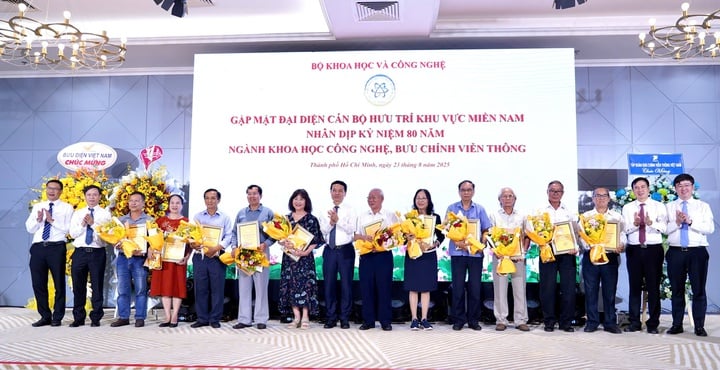
The Ministry of Science and Technology awarded the Industry's Gratitude Symbol to comrades and units with 40 to 70 years of dedication.
Center for Science and Technology Communication
Source: https://mst.gov.vn/mot-ky-nguyen-moi-dang-mo-ra-cho-khoa-hoc-cong-nghe-va-chuyen-doi-so-197250824130207158.htm




![[Photo] Party and State leaders meet with representatives of all walks of life](https://vphoto.vietnam.vn/thumb/1200x675/vietnam/resource/IMAGE/2025/8/24/66adc175d6ec402d90093f0a6764225b)
![[Photo] Phu Quoc: Propagating IUU prevention and control to the people](https://vphoto.vietnam.vn/thumb/1200x675/vietnam/resource/IMAGE/2025/8/24/f32e51cca8bf4ebc9899accf59353d90)








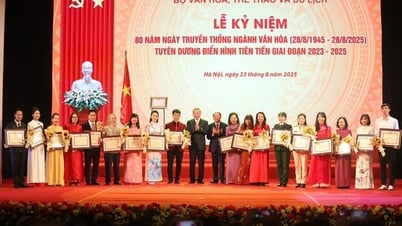
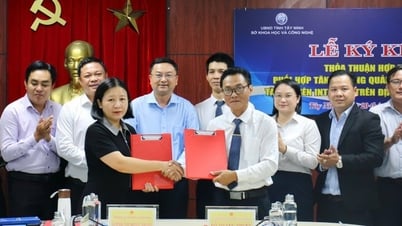
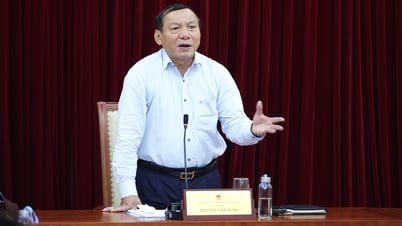







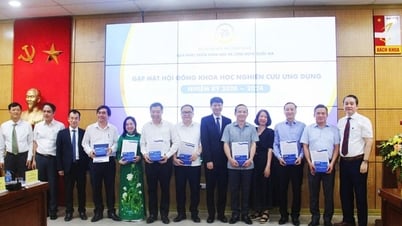

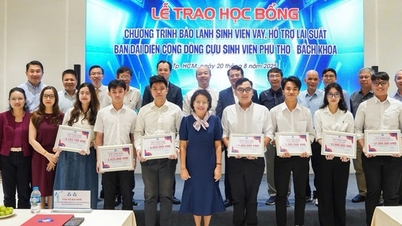


















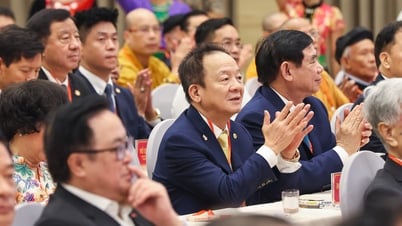












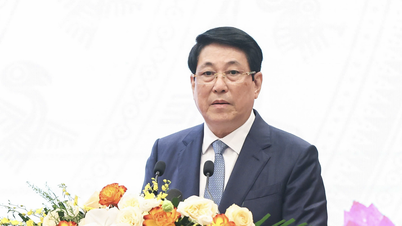








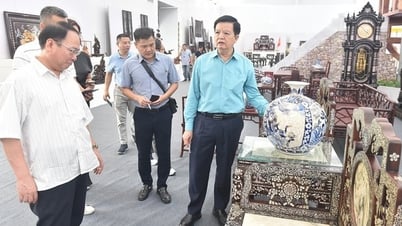





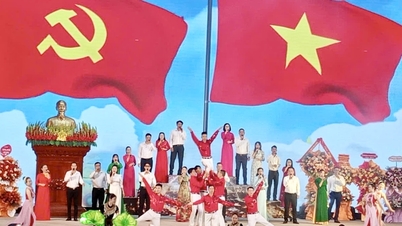
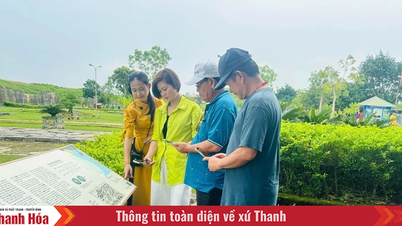




















Comment (0)